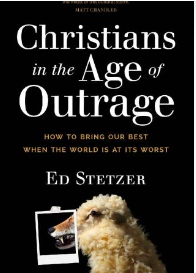Ed Stetzer |
Ed Stetzer, Ph.D., is a professor and dean at Wheaton College where he also serves as Executive Director of the Wheaton College Billy Graham Center. He has planted, revitalized, and pastored churches, trained pastors and church planters on six continents, has earned two master’s degrees and two doctorates, and has written hundreds of articles and a dozen books.
He is Regional Director for Lausanne North America, is the editor-in-chief of Outreach Magazine, and is frequently cited in, interviewed by, and writes for news outlets such as USAToday and CNN. He is the Founding Editor of The Gospel Project, a curriculum used by more than 1.7 million individuals each week for bible story.
His national radio show, Ed Stetzer Live, airs Saturdays on Moody Radio and affiliates.
He serves as interim teaching pastor of Calvary Church in New York City and serves as teaching pastor at Highpoint Church.
He is Regional Director for Lausanne North America, is the editor-in-chief of Outreach Magazine, and is frequently cited in, interviewed by, and writes for news outlets such as USAToday and CNN. He is the Founding Editor of The Gospel Project, a curriculum used by more than 1.7 million individuals each week for bible story.
His national radio show, Ed Stetzer Live, airs Saturdays on Moody Radio and affiliates.
He serves as interim teaching pastor of Calvary Church in New York City and serves as teaching pastor at Highpoint Church.
 Ed Stetzer Files
Ed Stetzer Files
One key to the growth of a movement is for its people to believe with conviction that what it possesses is so important that it is worth sharing with others. This is a significant reason for the explosive growth of the Calvary Chapel and Vineyard Church movements in the 1970s and 1980s, respectively. They wanted people to experience what they had to offer. Looking earlier back, Baptists thought that way in the 1950s. Methodists thought that way during the Second Great Awakening.
Pentecostals believe they have something worth sharing. That’s a conviction from which we can all learn. Simply put, a lightly held faith is not a faith that is shared. Pentecostals seem to be less likely to hold their faith lightly, and that makes a difference.
-Ed Stetzer; Church Leaders; Pentecostals: Their Growth and the Implications for Evangelicalism 7.14.23
Pentecostals believe they have something worth sharing. That’s a conviction from which we can all learn. Simply put, a lightly held faith is not a faith that is shared. Pentecostals seem to be less likely to hold their faith lightly, and that makes a difference.
-Ed Stetzer; Church Leaders; Pentecostals: Their Growth and the Implications for Evangelicalism 7.14.23

July 14, 2023:
Ed Stetzer posted an article at Church Leaders about how Pentecostals can turn the tide on their decline: "Pentecostalism is, by definition, a renewal movement. American Pentecostals cannot overlook the need for, as they often say, “a fresh touch of the Spirit.” Hiding the distinctives that have simultaneously made Pentecostals a “peculiar people” and propelled historic growth for the movement in favor of cultural relevance will likely have the opposite impact on growth than what those actions intend.
The emphasis on personal, experiential faith—especially a faith that touches the supernatural—also resonates deeply with the younger generational cohorts, who are much less suspicious of the supernatural than those who preceded them. Yet, these young people are also among the most racially and politically diverse generation in American history. Pentecostals would do well to consider (or even lean into) their historic identity as a movement that is deeply multi-ethnic, focused on both evangelism and social justice, and (prior to World War II) staunchly apolitical and pacifistic.
1)For a movement like Pentecostalism to continue to thrive, it must walk the fine line of returning to the roots of what has made it vibrant. Turning inward toward self-obsessed identity gatekeeping is the hallmark of stalling progress and eventual decline. 2) Pentecostals have to “tend to the fire,” lest the fire go out. For those within broader evangelicalism, this is a cautionary word for us as well. We need a fresh fire from the Holy Spirit to renew us, as expressed in the words of William Booth, founder of the Salvation Army, in his hymn Send the Fire: “Look down and see this waiting host / give us the promised Holy Ghost / we want another Pentecost / send the fire.”
I found it interesting since we are seeing a decline in church attendance and membership. The way I see it one of the main things churches need to dump is their political identities. Politics is something that can be done as a Christian but not because you are a Christian. Politics right now is mentally lethal and extremely divisive. Politics has never been in the foundation of Christianity. As Christians our identity should always be found in Christ and not the party of any political power. “Render unto Caesar what is Caesar’s and to God what is God’s.”
Ed Stetzer posted an article at Church Leaders about how Pentecostals can turn the tide on their decline: "Pentecostalism is, by definition, a renewal movement. American Pentecostals cannot overlook the need for, as they often say, “a fresh touch of the Spirit.” Hiding the distinctives that have simultaneously made Pentecostals a “peculiar people” and propelled historic growth for the movement in favor of cultural relevance will likely have the opposite impact on growth than what those actions intend.
The emphasis on personal, experiential faith—especially a faith that touches the supernatural—also resonates deeply with the younger generational cohorts, who are much less suspicious of the supernatural than those who preceded them. Yet, these young people are also among the most racially and politically diverse generation in American history. Pentecostals would do well to consider (or even lean into) their historic identity as a movement that is deeply multi-ethnic, focused on both evangelism and social justice, and (prior to World War II) staunchly apolitical and pacifistic.
1)For a movement like Pentecostalism to continue to thrive, it must walk the fine line of returning to the roots of what has made it vibrant. Turning inward toward self-obsessed identity gatekeeping is the hallmark of stalling progress and eventual decline. 2) Pentecostals have to “tend to the fire,” lest the fire go out. For those within broader evangelicalism, this is a cautionary word for us as well. We need a fresh fire from the Holy Spirit to renew us, as expressed in the words of William Booth, founder of the Salvation Army, in his hymn Send the Fire: “Look down and see this waiting host / give us the promised Holy Ghost / we want another Pentecost / send the fire.”
I found it interesting since we are seeing a decline in church attendance and membership. The way I see it one of the main things churches need to dump is their political identities. Politics is something that can be done as a Christian but not because you are a Christian. Politics right now is mentally lethal and extremely divisive. Politics has never been in the foundation of Christianity. As Christians our identity should always be found in Christ and not the party of any political power. “Render unto Caesar what is Caesar’s and to God what is God’s.”
Caesar will be like all the others. Earthly kingdoms will crumble and statues will erode. |
It seems to me that what Jesus says in his quote is that there is a place for the government. It has a rightful task and a duty it should fulfill. But even bringing God into consideration introduces a new dimension. The idea and reality of a Caesar is a grand and mighty thing, but as soon as we place God next to this earthly ruler, Caesar’s stature is immediately and radically put into perspective. Caesar will be like all the others. Earthly kingdoms will crumble and statues will erode.
Jesus had good reason to remain apart from politics. The message He preached was about government, but a government He would bring to the earth, not one that would come about through human effort. |
I end this with a quote I came across last night by the late Martyn Lloyd Jones:
“The terrible, tragic fallacy of the last hundred years has been to think that all man's troubles are due to his environment, and that to change the man you have nothing to do but change his environment. That is a tragic fallacy. It overlooks the fact that it was in Paradise that man fell.” ― David Martyn Lloyd-Jones, Studies in the Sermon on the Mount
“The terrible, tragic fallacy of the last hundred years has been to think that all man's troubles are due to his environment, and that to change the man you have nothing to do but change his environment. That is a tragic fallacy. It overlooks the fact that it was in Paradise that man fell.” ― David Martyn Lloyd-Jones, Studies in the Sermon on the Mount
Feb 10, 2023: Christianity Today: Data Shows that Americans Are Spiritually Open
Lucado joined David Kinnaman, author and CEO of Barna Group, and Ed Stetzer, executive director of the Wheaton College Billy Graham Center to talk about the unprecedented possibilities open to Christians today.
“This cultural moment that we’re in is one that is challenging but also has great opportunity,” said Stetzer.
Lucado joined David Kinnaman, author and CEO of Barna Group, and Ed Stetzer, executive director of the Wheaton College Billy Graham Center to talk about the unprecedented possibilities open to Christians today.
“This cultural moment that we’re in is one that is challenging but also has great opportunity,” said Stetzer.
Feb 7, 2023: Religion News: New Tim Keller Center for Apologetics hopes to help churches reach a changing country
Ed Stetzer, director of Wheaton College’s Billy Graham Center, who consulted with the “He Gets Us” campaign, called the ads “pre-evangelism,” establishing a familiarity with Jesus that pastors and other evangelists in the past could expect in nearly any American.
“The more distant Christian memory becomes in culture, the more you will need apologetics centers and pre-evangelism ad campaigns, he said.
Stetzer said Keller’s reputation for ministering in a secular urban setting makes him an apt model for the center that bears his name. “As the rest of the country becomes more like New York, they are going to want to hear from someone who has been in a similar situation and has been effective,” he said.
Ed Stetzer, director of Wheaton College’s Billy Graham Center, who consulted with the “He Gets Us” campaign, called the ads “pre-evangelism,” establishing a familiarity with Jesus that pastors and other evangelists in the past could expect in nearly any American.
“The more distant Christian memory becomes in culture, the more you will need apologetics centers and pre-evangelism ad campaigns, he said.
Stetzer said Keller’s reputation for ministering in a secular urban setting makes him an apt model for the center that bears his name. “As the rest of the country becomes more like New York, they are going to want to hear from someone who has been in a similar situation and has been effective,” he said.

"Just because we can say something doesn’t mean we should. There are ways of confronting abuses of power, and I am certainly not condoning a mindless obedience. But Christians need to understand that the best place for difficult conversations is usually not online.”
"Outrage exhibits few if any of the short- or long-term characteristics Scripture associates with righteous anger. Righteous anger is aimed at the glory of God,, but outrage is an angry reaction to personal injury or insult. Where righteous anger is purposeful and designed to advance specific objectives and ends, outrage exhibits little critical thought as to its underlying focus, motivations, expressions, or ends.
"Outrage is motivated by a desire to punish or destroy rather than reconcile or refine. It is frequently accompanied by hubris and a confidence in its judgment, categorically rejecting any nuance. Outrage is fast and decisive rather than reflective, choosing to exhibit God’s retribution rather than reflect his persistent, steadfast love." -Ed Stetzer; Christians in the Age of Outrage
"Outrage exhibits few if any of the short- or long-term characteristics Scripture associates with righteous anger. Righteous anger is aimed at the glory of God,, but outrage is an angry reaction to personal injury or insult. Where righteous anger is purposeful and designed to advance specific objectives and ends, outrage exhibits little critical thought as to its underlying focus, motivations, expressions, or ends.
"Outrage is motivated by a desire to punish or destroy rather than reconcile or refine. It is frequently accompanied by hubris and a confidence in its judgment, categorically rejecting any nuance. Outrage is fast and decisive rather than reflective, choosing to exhibit God’s retribution rather than reflect his persistent, steadfast love." -Ed Stetzer; Christians in the Age of Outrage
Mar 24, 2022: By Faith: ‘He Gets Us’ Campaign Aims to Spark Conversations About Jesus
Ed Stetzer, executive director of the Billy Graham Center, has been helping to share information about the initiative with Christian leaders and faith-based organizations across the U.S.
Ed Stetzer, executive director of the Billy Graham Center, has been helping to share information about the initiative with Christian leaders and faith-based organizations across the U.S.
Feb 4, 2022: American Conservative: Evangelicals: Who Are The Good & The Bad?
In my circles, there has been a lot of discussion about Megan Basham’s big piece about how the federal government used some high-profile Evangelical leaders to spread government information — and misinformation — about Covid to the broader Evangelical community. (If you don’t have a Daily Wire account, the piece has been reprinted here, available to all.)
As regular readers will know, I am not an anti-vaxxer, but this is genuinely a disturbing piece. The gist of it is that the feds leveraged the high status the Evangelical scientist Francis Collins has with Evangelical influencers to sell the government’s Covid line to Evangelical churches. Basham begins by citing Wheaton College’s Ed Stetzer, a dean and executive director of its Billy Graham Center, giving a friendly interview to Collins early in the pandemic:
In my circles, there has been a lot of discussion about Megan Basham’s big piece about how the federal government used some high-profile Evangelical leaders to spread government information — and misinformation — about Covid to the broader Evangelical community. (If you don’t have a Daily Wire account, the piece has been reprinted here, available to all.)
As regular readers will know, I am not an anti-vaxxer, but this is genuinely a disturbing piece. The gist of it is that the feds leveraged the high status the Evangelical scientist Francis Collins has with Evangelical influencers to sell the government’s Covid line to Evangelical churches. Basham begins by citing Wheaton College’s Ed Stetzer, a dean and executive director of its Billy Graham Center, giving a friendly interview to Collins early in the pandemic:
Aug 8, 2021: Christian Post: California recall: Calling the Christian Left's bluff on racial equity
Or how about other progressive Christian figures, like Russell Moore, Ed Stetzer, Pastor David Platt, Beth Moore or author Gregory Thompson, who have all advocated for greater levels of diversity.
Or how about other progressive Christian figures, like Russell Moore, Ed Stetzer, Pastor David Platt, Beth Moore or author Gregory Thompson, who have all advocated for greater levels of diversity.
Feb 28, 2018: Baptist Press: Stetzer undergirds evangelism at Billy Graham Center
Ed Stetzer works amid the aura of Billy Graham each day at Wheaton College.
Stetzer, a longtime Southern Baptist denominational personality who began as a church planter in Buffalo, N.Y., joined Wheaton’s faculty in 2016 as the Billy Graham Distinguished Chair of Church, Mission and Evangelism and as executive director of the college’s Billy Graham Center.
Ed Stetzer works amid the aura of Billy Graham each day at Wheaton College.
Stetzer, a longtime Southern Baptist denominational personality who began as a church planter in Buffalo, N.Y., joined Wheaton’s faculty in 2016 as the Billy Graham Distinguished Chair of Church, Mission and Evangelism and as executive director of the college’s Billy Graham Center.
Here are some key stats indicating the views of young evangelicals on hot button issues:
However, I still think we are safe saying that the moral and political views of young evangelicals are still more likely to line up with those of their parents than those of their non-evangelical peers.
It is easy to simply play “blame the millennial” for all the problems in the church and culture, but the statistics don’t bear that out. The vast majority of millennials remaining in the church share the values of older members. The much larger issue is that more millennials are becoming Nones and others are looking for spiritual fulfillment outside the church. Instead of critiquing the young adults who have stayed, we should be leveraging them to reach their peers. --Ed Stetzer (Christianity Today 08.10.16
- 82% say that abortion is wrong if the family cannot afford the child
- 72% say the use of marijuana is wrong
- 56% say embryonic stem cell research is wrong
- 85% say it is wrong that homosexuals should be allowed to marry
- 61% say it is wrong that homosexuals should be allowed to form civil unions
However, I still think we are safe saying that the moral and political views of young evangelicals are still more likely to line up with those of their parents than those of their non-evangelical peers.
It is easy to simply play “blame the millennial” for all the problems in the church and culture, but the statistics don’t bear that out. The vast majority of millennials remaining in the church share the values of older members. The much larger issue is that more millennials are becoming Nones and others are looking for spiritual fulfillment outside the church. Instead of critiquing the young adults who have stayed, we should be leveraging them to reach their peers. --Ed Stetzer (Christianity Today 08.10.16
May 16, 2016: Charisma: Why Ed Stetzer Suddenly Quit His Job and Resigned His Church
Dr. Ed Stetzer has been appointed to a newly created chair, The Billy Graham Distinguished Endowed Chair for Church, Mission, and Evangelism. In this role, he has been named Executive Director of the Billy Graham Center for Evangelism at Wheaton College (BGCE).
Stetzer will serve as chair of the Evangelism & Leadership Program in the Wheaton College Graduate School and as publisher of Evangelical Missions Quarterly. He will also provide vision-casting and leadership to existing BGCE initiatives, and will spearhead new initiatives that include the creation of a National Evangelism Leaders Fellowship.
Dr. Ed Stetzer has been appointed to a newly created chair, The Billy Graham Distinguished Endowed Chair for Church, Mission, and Evangelism. In this role, he has been named Executive Director of the Billy Graham Center for Evangelism at Wheaton College (BGCE).
Stetzer will serve as chair of the Evangelism & Leadership Program in the Wheaton College Graduate School and as publisher of Evangelical Missions Quarterly. He will also provide vision-casting and leadership to existing BGCE initiatives, and will spearhead new initiatives that include the creation of a National Evangelism Leaders Fellowship.
 Ed Stetzer Files
Ed Stetzer Files
“If there was ever a group of people that should care about the truth, it should be the people who believe the truth sets you free. Integrity should matter for Christians, but too often it does not....Proverbs 28:28 explains, "The one who lives with integrity will be helped, but one who distorts right and wrong will suddenly fall.”
-Ed Stetzer; Christianity Today; 2015
 Ed Stetzer Files
Ed Stetzer Files
“There’s a popular saying often repeated by Christians. It has found new life on Facebook and Twitter. Maybe you have even uttered these words, commonly at tributed to Francis of Assisi: ‘Preach the gospel. Use words if necessary.’
“I think we can appreciate what many are getting at when they say something like this. As Christians, we should live in such a way that our lives point to the person and work of Jesus. However, good intentions cannot overcome two basic problems with this quote and its supposed origin. One, Francis never said it, and two, the quote is not biblical.
“Mark Galli has pointed out that there is no record of Francis, a member of a preaching order, uttering anything close to this. In fact, everything we know about the man suggests he would not have agreed with his supposed quote. He was well known for his preaching and often preached up to five times a day.
“The idea may not have resonated with Francis; but for many today, wordless ministry is a compelling approach. ‘Words are cheap,’ we like to say, and ‘Actions speak louder than words.’ Galli explains the sentiment complements our culture rather well:
“‘Preach the gospel; use words if necessary’ goes hand in hand with a postmodern assumption that words are finally empty of meaning. It subtly denigrates the high value that the prophets, Jesus and Paul put on preaching.
--Ed Stetzer; Outreach Magazine; Preach the Gospel, and Since It’s Necessary, Use Words 8.5.15
“I think we can appreciate what many are getting at when they say something like this. As Christians, we should live in such a way that our lives point to the person and work of Jesus. However, good intentions cannot overcome two basic problems with this quote and its supposed origin. One, Francis never said it, and two, the quote is not biblical.
“Mark Galli has pointed out that there is no record of Francis, a member of a preaching order, uttering anything close to this. In fact, everything we know about the man suggests he would not have agreed with his supposed quote. He was well known for his preaching and often preached up to five times a day.
“The idea may not have resonated with Francis; but for many today, wordless ministry is a compelling approach. ‘Words are cheap,’ we like to say, and ‘Actions speak louder than words.’ Galli explains the sentiment complements our culture rather well:
“‘Preach the gospel; use words if necessary’ goes hand in hand with a postmodern assumption that words are finally empty of meaning. It subtly denigrates the high value that the prophets, Jesus and Paul put on preaching.
--Ed Stetzer; Outreach Magazine; Preach the Gospel, and Since It’s Necessary, Use Words 8.5.15
July 22, 2015: Charisma: What? Evangelicals Come Against Franklin Graham's Views on Islam
"Most recent headlines regarding Islam don't paint a picture of religious freedom—so we should not be surprised by the strong minority that considers Islam a threat to religious freedom," said Ed Stetzer, executive director of LifeWay Research.
"Most recent headlines regarding Islam don't paint a picture of religious freedom—so we should not be surprised by the strong minority that considers Islam a threat to religious freedom," said Ed Stetzer, executive director of LifeWay Research.
Apr 8, 2015: Ed Stetzer: Christianity Today: The Lego Principle: An Interview with Joey Bonifacio
Feb 27, 2015: Ed Stetzer: Christianity Today: Stories of Transformation: Emmanuel Community Church Looks for Purpose
Feb 25, 2015: Religion News: Who’s watching all that Christian media? Christians, but not many others
But Ed Stetzer, executive director of Nashville-based LifeWay Research, which released the data Wednesday (Feb. 25), sees good news in the numbers
“Most people would be surprised that 1 in 3 of their neighbors is watching Christian TV. Do 1 in 3 watch the nightly news? I don’t think so. It’s an overlooked segment of society that is larger than most people think,” he said.
But Ed Stetzer, executive director of Nashville-based LifeWay Research, which released the data Wednesday (Feb. 25), sees good news in the numbers
“Most people would be surprised that 1 in 3 of their neighbors is watching Christian TV. Do 1 in 3 watch the nightly news? I don’t think so. It’s an overlooked segment of society that is larger than most people think,” he said.
Feb 13, 2015: Pulpit and Pen: Ed Stetzer, Charles Spurgeon, And Preaching to Circuses
Ed Stetzer has faced some criticism lately. Criticism, of course, that began with some unkind words to a certain friend of Pulpit & Pen on Twitter and culminated in an open letter to Lifeway by one of the victims of the entity’s pursuit for filthy lucre, a young man named Alex Malarkey, which just happened to wind up first on this blog and then on every major news source and media outlet in the western world. Of course, Stetzer and others at Lifeway don’t exactly deal well with criticism.
Ed Stetzer has faced some criticism lately. Criticism, of course, that began with some unkind words to a certain friend of Pulpit & Pen on Twitter and culminated in an open letter to Lifeway by one of the victims of the entity’s pursuit for filthy lucre, a young man named Alex Malarkey, which just happened to wind up first on this blog and then on every major news source and media outlet in the western world. Of course, Stetzer and others at Lifeway don’t exactly deal well with criticism.
Feb 11, 2015: Lifeway: One in Three Americans Worry About Sharia Law Being Applied in America
“ISIS has stirred an odd religious debate in America today,” said Ed Stetzer, executive director of LifeWay Research. “In a nation that has long espoused religious freedom, Americans are thinking long and hard about the kind of society Islam fosters – especially the more radical groups that say they are Islamic – and whether Sharia law would ever be adopted here.”
“ISIS has stirred an odd religious debate in America today,” said Ed Stetzer, executive director of LifeWay Research. “In a nation that has long espoused religious freedom, Americans are thinking long and hard about the kind of society Islam fosters – especially the more radical groups that say they are Islamic – and whether Sharia law would ever be adopted here.”
Jan 9, 2015: Ed Stetzer: Christianity Today: The Bible Is More Than Stories of Morality
Dec 18, 2014: Ken Chitwood: 2014's Religion & Culture Top Stories & Awards
Son of renowned Christian author and theologian Francis Schaeffer, Frank Scaeffer is no new news. He is a gregarious and outspoken atheist who "believes in faith." But this year he got embroiled in a tit-for-tat with Christianity Today and evangelical leader Ed Stetzer over a story about Bart Campolo, son of famed Christian leaders Tony and Peggy Campolo, leaving the Christian faith. On top of all this, Frank came out with a new self-published book this year, titled Why I am an Atheist Who Believes in God: How to give love, create beauty and find peace.
Son of renowned Christian author and theologian Francis Schaeffer, Frank Scaeffer is no new news. He is a gregarious and outspoken atheist who "believes in faith." But this year he got embroiled in a tit-for-tat with Christianity Today and evangelical leader Ed Stetzer over a story about Bart Campolo, son of famed Christian leaders Tony and Peggy Campolo, leaving the Christian faith. On top of all this, Frank came out with a new self-published book this year, titled Why I am an Atheist Who Believes in God: How to give love, create beauty and find peace.
Sept 30, 2014: Ed Stetzer: Christianity Today: Deconversion: Some Thoughts on Bart Campolo’s Departure from Christianity
 Ed Stetzer Files
Ed Stetzer Files
“In sensory stimulation, Hillsong’s productions rival any other contemporary form of entertainment...........There’s no question there’s a real current of evangelical enamorment with cities.....Evangelicals have been a rural people historically, and the cities were the places where sin was. But cities are also where the people are.”
-Ed Stetzer on Hillsong; New York Times; Megachurch With a Beat Lures a Young Flock; 9.9.14
-Ed Stetzer on Hillsong; New York Times; Megachurch With a Beat Lures a Young Flock; 9.9.14


